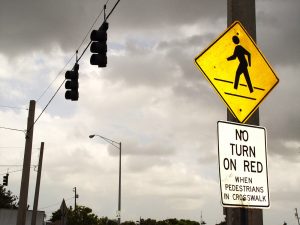Keeping Kids Safe Means Minimizing South Florida School Zone Crash Risk
 School zone or zoo? Anyone who’s traversed a school zone South Florida at busy pickup or drop-off times might have a tough time discerning. For all school officials and traffic safety engineers prioritize keeping kids safe, the Florida school zone crash risk is still high : Speeding drivers, school bus drivers with big blind spots, distracted walkers and cyclists (especially those with noise-canceling headphones), jaywalkers, and unsafe pickup/drop off behaviors in among 1/3 drivers (double-parking, stopping in the middle of the crosswalk, etc.).
School zone or zoo? Anyone who’s traversed a school zone South Florida at busy pickup or drop-off times might have a tough time discerning. For all school officials and traffic safety engineers prioritize keeping kids safe, the Florida school zone crash risk is still high : Speeding drivers, school bus drivers with big blind spots, distracted walkers and cyclists (especially those with noise-canceling headphones), jaywalkers, and unsafe pickup/drop off behaviors in among 1/3 drivers (double-parking, stopping in the middle of the crosswalk, etc.).
There are an estimated 3.2 million schoolchildren in the U.S. (public and private). According to the Florida Department of Education, about 500,000 students ride a bus. In Lee, Collier, and Charlotte Counties, about 25%-35% of kids take the bus. The rest walk, ride a bike, or are car riders. In Lee County alone, 1,300 students are classified as facing “hazardous walking conditions” on their way to school (about 12,300 statewide).
According to the Transportation Research Board, an estimated 25,000 kids are injured and 100 are killed each year while walking to or from school. Not all of those happen in school zones, though most do involve speeding vehicles. About 30 percent of school zones do not have crosswalks.
As longtime Fort Myers personal injury lawyers, we know that unfortunately, Florida has the third-highest number of annual child traffic deaths, and consistently ranks at the top of the list for child pedestrian and bicycle deaths. According to the National Highway Traffic Safety Administration (NHTSA), the most dangerous time for child pedestrians is between 3 p.m. and 6 p.m. – after school hours.
Traffic Rules in Florida School Zones
The posted speed limit in most Florida school zones is 20 mph, though some cities and counties have lowered it even further to 15 mph. Going even 1 mph over that limit can result in a $50 fine – without any prior warnings. Anything above that, and you’re facing a fine of between $200 and $500 (depending on how fast you’re going), plus 3 points on your license (both of which can be waived if the prosecutor allows you to take a traffic safety course). Flashing yellow lights are drivers’ main indicator upon entering and exiting. Enforcement times are typically posted on road signage, though it’s usually 30 minutes prior to the start of school, during school hours, and 30 minutes after school hours have concluded. And in case you didn’t know: It’s illegal to obstruct a crosswalk in a school zone, even if you’re picking up or dropping off a child. If there’s a crossing guard, drivers must obey all their instructions.
In an effort to bolster student safety near schools, a new Florida law went into effect July 1, 2023 to heighten enforcement of school zone speed limits. The law authorizes city or county governments to enforce speed limits in school zones with speed detection systems (similar to red light cameras). Although the idea of speed cameras isn’t especially popular with motorists, the U.S. Centers for Disease Control & Prevention reports their presence can reduce the total crash risk from 8 to 49 percent.
Some say it doesn’t go far enough, though, because violators won’t incur points on their license, and their infractions won’t result in higher auto insurance rates.
Existing law outlined in F.S. 316.306 prohibits the use of handheld wireless communication devices (cell phones, mainly) while driving through a designated school crossing or in a school zone. To do so is considered a primary offense (for which police can initiate a traffic stop).





 Florida Personal Injury Lawyer Blog
Florida Personal Injury Lawyer Blog



 A sidewalk stroll in the South Florida sunshine should be a safe way to spend an afternoon. Unfortunately, walking alongside, in, around, and across Florida roadways is quite dangerous – and it’s only gotten worse in recent years. According to a new report by the
A sidewalk stroll in the South Florida sunshine should be a safe way to spend an afternoon. Unfortunately, walking alongside, in, around, and across Florida roadways is quite dangerous – and it’s only gotten worse in recent years. According to a new report by the  We all know that when an emergency vehicle approaches with its lights flashing and sirens blaring, other motorists should make way – and fast. But what if you cannot move quickly enough? What if you did not see the lights or hear the sirens before it was too late? What if there were no lights or sirens activated at all? Over the years our law firm has received many calls regarding Florida emergency vehicle laws; As our South Florida injury lawyers can explain, state law allows for legal accountability in Florida emergency vehicle accidents in some circumstances. Proving it will likely require an extensive investigation, expert witness testimony, and an experienced legal team.
We all know that when an emergency vehicle approaches with its lights flashing and sirens blaring, other motorists should make way – and fast. But what if you cannot move quickly enough? What if you did not see the lights or hear the sirens before it was too late? What if there were no lights or sirens activated at all? Over the years our law firm has received many calls regarding Florida emergency vehicle laws; As our South Florida injury lawyers can explain, state law allows for legal accountability in Florida emergency vehicle accidents in some circumstances. Proving it will likely require an extensive investigation, expert witness testimony, and an experienced legal team. Even as the number of fatal traffic accidents has fallen over the last 10 years, pedestrian accident deaths have spiked more than 35 percent. Florida claims 8 of the Top 10 most dangerous metro areas for pedestrians, according to Smart Growth America’s
Even as the number of fatal traffic accidents has fallen over the last 10 years, pedestrian accident deaths have spiked more than 35 percent. Florida claims 8 of the Top 10 most dangerous metro areas for pedestrians, according to Smart Growth America’s  First, the good news: The Cape-Coral-Fort Myers metro area is no longer ranked No. 1 as the most dangerous place to walk along the roadside. But cause for celebration is tempered, as our Cape Coral pedestrian accident attorneys can explain because this area still ranks No. 8 out of 20. Further, 8 of the top 10 most dangerous communities are in Florida. Nine of the top 10 were in the Southern U.S.
First, the good news: The Cape-Coral-Fort Myers metro area is no longer ranked No. 1 as the most dangerous place to walk along the roadside. But cause for celebration is tempered, as our Cape Coral pedestrian accident attorneys can explain because this area still ranks No. 8 out of 20. Further, 8 of the top 10 most dangerous communities are in Florida. Nine of the top 10 were in the Southern U.S. Fort Myers personal injury lawyers know that “trains” aren’t typically the first thing that comes to mind when we talk “crashes.” However, a recent four-year review of data from the
Fort Myers personal injury lawyers know that “trains” aren’t typically the first thing that comes to mind when we talk “crashes.” However, a recent four-year review of data from the 








